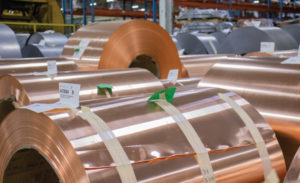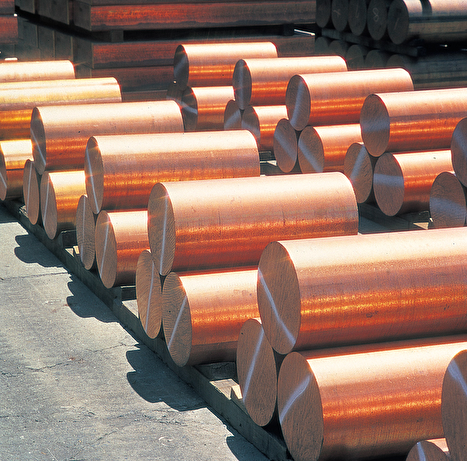Uncovering the Health And Wellness Perks of Using Copper Products in Everyday Life
Uncovering the Health And Wellness Perks of Using Copper Products in Everyday Life
Blog Article
Exploring the Diverse Applications of Copper Products in Modern Industries
Copper products have established themselves as essential components throughout a myriad of contemporary markets, primarily as a result of their impressive conductivity, pliability, and resistance to corrosion. From boosting the performance of electrical systems to playing an essential duty in renewable resource modern technologies, the adaptability of copper appears. Moreover, its recyclability placements it as a lasting choice in production and electronics. As markets increasingly focus on development and sustainability, the varied applications of copper call for a closer examination, specifically concerning their potential influence on future technological innovations and environmental methods.
Electrical Applications of Copper
Copper is a crucial product in the electric sector, making up about 60% of the overall need for non-ferrous steels around the world - Copper Products. Its premium electrical conductivity, which is nearly two times that of light weight aluminum, makes it the preferred selection for a large range of electrical applications. From circuitry systems in residential and commercial buildings to high-voltage power transmission lines, copper ensures efficiency and reliability in electrical power distribution
Along with electrical wiring, copper is important to the production of electric components such as transformers, motors, and generators. These elements take advantage of copper's thermal conductivity and pliability, vital for heat dissipation and effective efficiency. Copper's resistance to rust enhances the lifespan and sturdiness of electrical systems, making it a cost-efficient option in the long term.
The growth of renewable resource resources, such as solar and wind power, has actually better enhanced the need for copper in electric applications. As sectors change in the direction of sustainable energy services, copper's duty ends up being much more important. On the whole, the convenience and efficiency characteristics of copper solidify its condition as a cornerstone material within the electrical market, driving technology and efficiency throughout different applications.
Pipes and Piping Solutions
In contemporary plumbing systems, the option of products dramatically influences both capability and longevity. Copper has emerged as a favored option due to its special residential properties, consisting of rust resistance and antimicrobial qualities. These attributes make sure that copper piping stays resilient and safe for delivering drinkable water, an important factor to consider in domestic and business applications.
One of the vital advantages of copper in plumbing is its capacity to withstand heats and stress, making it appropriate for a variety of applications, from warm water systems to heating and cooling down networks. Furthermore, copper's flexibility enables less complicated setup in complex piping designs, lowering the risk of leakages and failures.
An additional noteworthy benefit is copper's lengthy lifespan, often exceeding half a century with proper maintenance. This long life not only reduces substitute costs yet also adds to lasting practices by minimizing waste. Copper's recyclability lines up with modern-day environmental requirements, promoting a circular economic situation within the plumbing industry.
Copper in Renewable Resource
The flexibility of copper prolongs beyond pipes applications, playing a vital function in the renewable power market. In solar panels, copper is utilized in solar cells and wiring, helping with effective power conversion and transmission.

Additionally, as the international demand for electrical vehicles (EVs) boosts, copper's function in battery systems and billing framework becomes a lot more significant. The material's capability to conduct electrical power effectively is indispensable to the efficiency of EV batteries, boosting array and charging speed.
Copper's Function in Electronics
Electronics producing relies greatly on copper's remarkable residential properties, specifically its high electric conductivity and thermal performance. These attributes make copper a suitable selection for a large range of digital elements, consisting of adapters, circuit card, and electrical wiring. The metal's capacity to efficiently transmit electric signals makes certain marginal power loss, which is essential in high-performance electronic devices.
In addition, copper's thermal conductivity plays a substantial function in warmth dissipation, protecting delicate elements from overheating. This is particularly important in contemporary electronic devices, where small designs bring about boosted heat generation. Copper is also favored for its pliability and ductility, enabling it to be conveniently formed into complex designs that fulfill the demands of advanced digital applications.
With the increase of customer electronics, telecoms, and electric cars, the need for copper in the electronic devices industry proceeds to grow. Therefore, copper continues to be a cornerstone material in the ever-expanding field of electronic devices.
Ingenious Uses in Production

One remarkable application is in additive production, where copper-based products are used in 3D printing processes. This permits for the creation of intricate geometries and light-weight parts, particularly in the aerospace and vehicle sectors. In addition, copper's thermal conductivity makes it a suitable choice for heat exchangers, enhancing performance in industrial air conditioning systems.
Furthermore, the surge of clever manufacturing has actually seen the incorporation of copper in IoT tools, where its conductive capabilities support advanced picking up modern technologies. In the world of renewable resource, copper is pivotal in the production of solar panels and wind turbines, facilitating much more effective energy conversion and circulation.
As industries pursue sustainability and development, copper's flexibility and performance continue to position it as a vital material, driving advancements in manufacturing and contributing to the development of smarter, much more effective products.
Conclusion
The integral role of copper in eco-friendly energy and its important feature in electronics emphasize its significance in advancing lasting methods. Jointly, these applications illustrate copper's critical payment to technical development and commercial effectiveness in modern society.
From improving the performance of electrical systems to playing a crucial function in eco-friendly energy modern technologies, the adaptability of copper is obvious. As sectors progressively focus on innovation and sustainability, the diverse applications pop over to these guys of copper call for a closer assessment, specifically regarding their prospective influence on future technical developments and ecological methods.
The growth of sustainable energy sources, such as solar and wind power, has additionally raised the demand for copper in electric applications. In general, the adaptability and efficiency features of copper solidify its status as a cornerstone material within the electric market, driving innovation and effectiveness throughout different applications.
The adaptability of copper extends beyond plumbing applications, playing a crucial duty in the renewable energy field.
Report this page